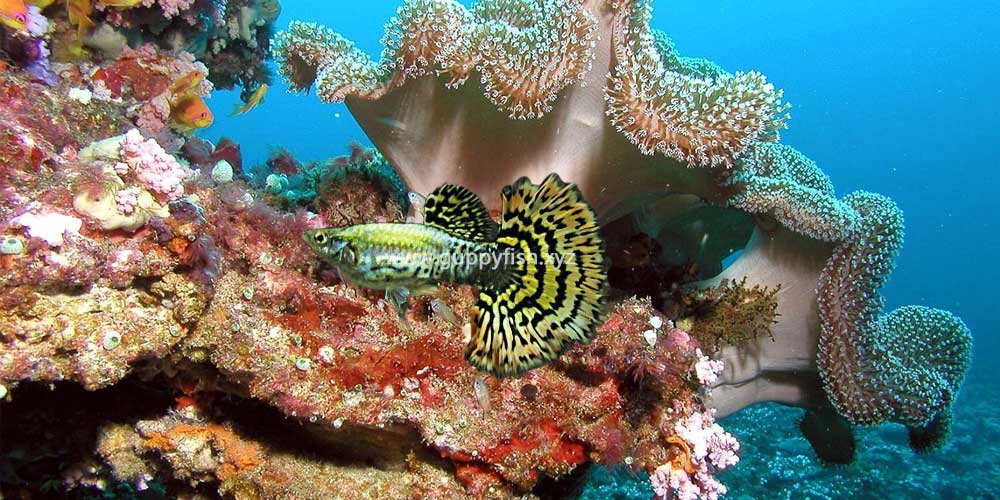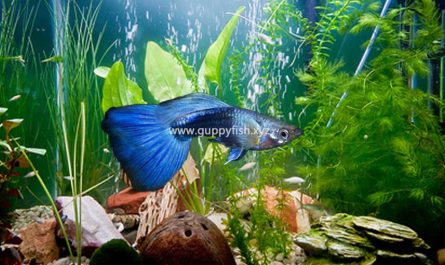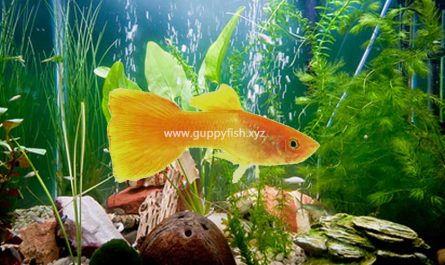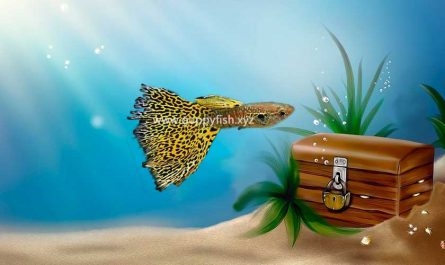Mosaic Guppy Fish Specifications
| Scientific Name | Poecilia Reticullata |
| Caring | Easy |
| Nature | Peaceful |
| Color | Any Color Possible With Mosaic Pattern On Skin |
| Lifespan | Up to 2 years |
| Size | 0.6 – 1.4 inches (Male) 1.2 – 2.4 inches (Female) |
| Diet Type | Omnivores |
| Tank Size For 3 Fish | 5 gallons |
| Tank Set-Up | Freshwater, plants and substrate |
| Compatibility | Other peaceful community fish |
Mosaic Guppy Fish has a scientific name Poecilia Reticulata. It is one of the most vibrant and colorful guppy variety you can find right now in the market. Mosaic Guppies typically poses a regular color arrangement. If the fish has a blue body color then its alloy color is yellow whereas if its body color is dark blue then its alloy color is red. Mosaic Guppy has a blue color at the base of the tail and fins. They also have mosaic patterns of wavy lines and dots on their body, tail and fins which gives them a very unique character of their own that no other guppy poses.
Mosaic Guppies look beautiful and are certainly the best choice to increase the overall ambiance of a fish aquarium. They are very easy to maintain and anyone with little knowledge can keep them healthy. They are easily available at a very low price which makes them the perfect choice for fish keepers.
Mosaic Guppy Fish Habitat In The Wild
Guppies are one of the most popular widely distributed tropical fish. They are also the most popular freshwater aquarium fish species.
Guppy Fish have their origins in South America. They were later introduced to different habitats and now they are available all over the world.
Guppies are very adaptable fish that can survive in different ecosystems and environments.
They prefer Brackish water which is basically a mixture of freshwater and saltwater. It has salinity more than fresh water but less than sea water.
Guppies in the wild survives by eating worms, larvae, blood-worm and various small insects.
Mosaic Guppy Fish Size
Mosaic Guppies are very small sized fish with a elongated body. They look very attractive due to their short dimensions.
Sizes of male and female guppy differs from each other. Male guppies are 0.6 to 1.4 inches long, whereas female guppies are 1.2 to 2.4 inches long.
Gender Of Mosaic Guppy Fish
Distinguishing a Mosaic guppy male from female is a very simple task.
Mosaic Male guppies are generally shorter, slimmer in length, have bright colors, attractive tail and patterns, large fins, anal fin is modified into gonopodium.
Mosaic Female Guppies are longer, bulkier, have pale colors, short fins, large abdomen with dark gravid spot, eggs also clearly visible in pregnant females.
Find more information about Distinguishing Female Guppies From Male.
Lifespan Of Mosaic Guppy Fish
Mosaic Guppy fish on average has a lifespan of about 2 years. Although they can even live upto 3 years, If they are kept healthy with good tank maintenance and guppy fish caring.
Ideal Water Temperature For Mosaic Guppy Fish
Mosaic Guppies are tropical fish and prefer a warmer temperature of water.
Temperature plays a very important role as it is inversely proportional to the metabolism rate of guppies.
So if aquarium tank temperature rises considerably the guppies in the tank will have shorter lifespan. Gestation period will also become shorter and new babies will have less immunity towards diseases.
If the aquarium tank temperature is lowered considerably, the guppies will grow larger and will have larger lifespan. Although they can easily get ill. Babies born will be larger in size but will suffer from different health conditions at later stages of life.
Therefore maintaining a stable temperature for keeping guppies healthy is very important. The ideal temperature for guppies is between 22 to 28°С (72 to 80°F). You can install a heater in the fish tank to maintain a healthy warmer climate for your guppies.
Ideal pH Levels For Mosaic Guppies
Mosaic Guppies are generally very hard fish and they can exist in different pH levels. Although they don’t like soft acidic water. The ideal pH for keeping guppies is 7 to 8. It is very advisable to keep Best pH levels for your guppies.
If you would like to increase pH levels in your fish tank, then please read our article Increase pH levels in your aquarium fish tank.
Also, If you would like to reduce pH levels in your fish tank, then please read our article reduce pH levels in your aquarium fish tank.
Feeding Mosaic Guppy Fish
Mosaic Guppies love eating different kinds of food such as live, artificial and frozen. Guppies have very small mouth and stomach and therefore the food should be small in size. We suggest you to feed them 2 to 3 times in a day with a quantity that they can eat up in 3 minutes.
Live food for Mosaic guppies includes blood worm, tubifex, brine shrimp and corethra.
Artificial food for Mosaic guppies includes flakes, pellets and other famous trademarked packaged foods. Guppies gladly eats these type of foods.
Frozen food for Mosaic guppies include vegetables, fruits and other packaged foods. Vegetables and fruits are very healthy source of feed for guppies and are said to increase their immunity.
Breeding Mosaic Guppy Fish
Mosaic Guppies are one of the most easiest breeding fish with very less care and maintenance. They are also called beginner’s fish. Basically a single male guppy is sufficient for 3 to 5 females to start breeding process. Mating is performed multiple times in order to achieve offspring’s with better health and immunity.
Guppies are live bearers i.e. they give birth to live swimming offspring’s instead of laying eggs. If you want to learn more about breeding guppies in brief, Please read our article 8 Easy Steps For Breeding Guppies Like A Pro.
Mosaic Guppies Other Compatible Fish
Mosaic Guppies are very peaceful and non-aggressive fish that doesn’t troubles it’s tank mates.
Mosaic Guppies will be compatible with other peaceful and small fishes such as Dwarf Gourami, Harlequin Rasbora, Mollies, Platy, Cherry Barb, White Cloud Mountain Minnow and Bristle-nose Pleco.
Mosaic Guppies should not be kept with large and predator fishes such as Green Terror, Tiger Barb, Tetra Fish, Angelfish and Jack Dempsey.



